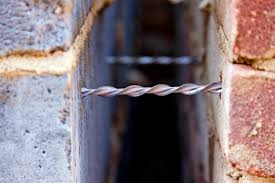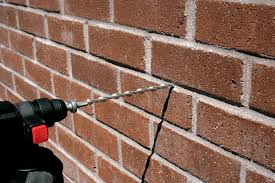In most houses dating from 1930s onwards, cavity wall ties were connected between the outer and inner leaves; these ties were made of mild steel and have over time corroded and, in some cases, created a weakness that is often manifested in cracking to either the outer or both skins of the property.
Any wall tie made of mild steel will eventually corrode. It’s almost impossible to say how long these will last, however, properties constructed between 1940 and the mid-1960s can be roughly estimated as follows:
- Wire Ties – between 15 – 30 years
- Strip Ties – between 30 – 60 years
For properties constructed between the mid-1960s and early 1980s:
- Wire Ties – between 13 – 26 years
- Strip Ties – between 23 – 46 years
As technology and consciousness of rusting and deterioration developed, zinc and galvanised became the coating of choice providing the ties with a water and moisture resistant outer layer to further their longevity and lifespan.
Today, stainless steel has taken over from zinc coated or galvanised steel due to its increased resistance to rusting and corrosion.
If you are in any doubt about the condition of your wall ties Surveying Cymru can carry out thorough wall tie examination. This will allow us to visually inspect your property and produce a full report on the wall tie condition using our specialist equipment.

WHAT OUR CLIENTS SAY
It may be a daunting thought but a professional inspection by Surveying Cymru will tell you the exact condition of your wall ties. Following this you will know exactly what is required in order to resolve any issues identified, saving in the long term any future solutions due to incorrect diagnosis.
At Surveying Cymru we utilise a Helical Screw – These ties look very similar to a long corkscrew and feature quite a course, wide thread. A pilot hole is drilled (normally around 6mm in diameter) through the outer cavity wall and into the inner to the required depth. Using a special setting tool inserted into a hammer drill, the tie is screwed into the walls in much the same way as a traditional wood screw would be screwed into a piece of timber. These are generally regarded as being safe to use on any condition brick or block walls
Stainless steel helical wall ties are the choice of the professional for tying masonry walls.
The ties are suitable for replacing cavity wall ties where existing ties are suffering from corrosion or are missing giving;
- Rapid cost-effective installation
- Precise helical interlock anchorage
- Combined axial strength and flexibility
- Stable, reliable & unobtrusive
- Reliable in all types of masonry
- Robust and corrosion free
Contact us today to arrange an inspection and we will carry out a full, impartial assessment of your cavity wall ties. Or call us to discuss your options.
